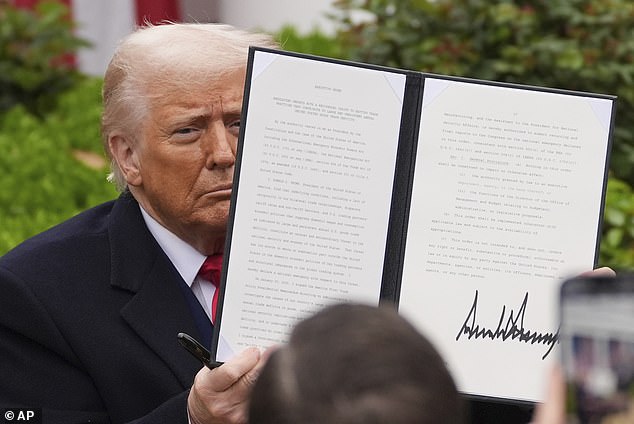US President Donald Trump’s threat this week to slap tariffs on drug companies could leave your pension looking a lot less healthy and deal a body blow to Britain’s leading life sciences sector.
If the tariff-loving leader goes ahead with his plans, it will hit AstraZeneca – the most valuable company on the UK stock market. It will also affect rival GSK, another stalwart of the FTSE 100.
Shares in the two companies have already been sliding, even before any tariffs are introduced. AstraZeneca shares are down nearly 10 per cent this month and the GSK share price has fallen 9 per cent, too.
This is a worrying development for an army of British savers who hold shares in the pharmaceutical titans, which are two of the most respected businesses on the UK stock market.
Millions more Britons have a stake indirectly in these companies through their pension pots.
Sir Pascal Soriot, the boss of Astra, and Dame Emma Walmsley, his counterpart at GSK, are scrambling to deal with the looming threat of US tariffs.
Medicines escaped the initial barrage announced by Trump on his so-called ‘Liberation Day’ two weeks ago.
But this week the President launched an investigation into imports of pharmaceuticals that is seen as the first step in a bid to impose tariffs.

US President Donald Trump’s threat this week to slap tariffs on drug companies could leave your pension looking a lot less healthy
Trump suggested the levy could be 25 per cent and could take effect in the ‘not-too-distant future’.
As well as causing concern among shareholders in AstraZeneca and GSK, this risks serious damage to Britain’s life sciences industry.
This is one of the jewels in the crown of the UK economy, which directly and indirectly supports more than 200,000 high-value jobs.
These tariffs could act as a catalyst for the drug giants to carry out more manufacturing as well as research and development in the US.
Such a switch may mean they avoid the tax – but at the cost of jobs and innovation here in the UK.
Ministers have prioritised the issue of pharma tariffs in frantic negotiations for a wider trade deal with the US.
The move on drugs giants is not a total shock, however. The thinking in the Trump camp appears to be that Americans are being ripped off by foreigners.
Patients overseas are, on this view, receiving cheaper medicines that are effectively subsidised by the US – it has the largest expenditure on research anywhere in the world. Drug prices are higher, sometimes much higher, in the US than elsewhere, too.
Whatever the merits or otherwise of this argument, Trump clearly sees the pharma sector as a potentially lucrative target from which he could raise revenues through tariffs.
It was previously exempt under an agreement struck in 1994 at the World Trade Organisation (WTO), the international body which regulates the rules surrounding global trade.
Under that pact, the US, the UK, the EU, Japan, Canada, Norway and Switzerland agreed not to put tariffs or similar charges on pharmaceuticals and some of the ingredients and chemicals used to make them.
In the eyes of many, tariffs on essential medical treatments are morally dubious, because they could make drugs dearer for patients.
But the WTO agreement now looks fragile in the face of Trump’s tariff-raising zeal.
If so, it will hit the UK particularly hard. Pharmaceuticals are the UK’s second-largest export to the US after cars.
In 2023, medicinal and pharmaceutical products accounted for £8.8billion worth of British exports to America, nearly 15 per cent of the total.
Cambridge-based AstraZeneca is the most highly valued stock market company in the UK at about £160 billion. It employs some 10,000 people in Britain and many more around the world. Meanwhile, London-based GSK is worth £55 billion and boasts 11,000 UK staff.
Both companies also rely on America’s vast drug market for a huge chunk of their sales. AstraZeneca last year made 44 per cent of its sales from the US market. For GSK, the share was even higher at 52 per cent.
Both firms already have extensive operations and manufacturing facilities in the US but remain vulnerable to tariffs on imports.
American drug prices are the most costly in the world. Unlike in the UK, where the NHS offers treatment free at the point of need, patients may have to shoulder the cost themselves if it is not covered by their health insurance.

Cambridge-based AstraZeneca is the most highly valued stock market company in the UK at about £160 billion and employs some 10,000 people in Britain
Policies, which are often provided by employers, can cost thousands of dollars a year in premiums.
Drug prices are typically lower in the UK owing to price controls limiting the amount pharma companies can charge the taxpayer-funded Health Service.
In the US, by contrast, this is mostly left to market forces, which usually results in vastly higher drug prices.
It is not self-evident that tariffs would result in lower medicine prices in the US.
Tariffs could, critics say, push up drug prices even higher for patients in the US, which could leave some without the medication they need.
It also makes it more expensive to bring drugs to market and could harm pharma companies’ profits if they absorb some of the increased costs.
As for investors, GSK and AstraZeneca are trying to reassure shareholders that they are adapting to the threat of tariffs.
They are pouring increasing investment into the US to build more factories in the country to make drugs there, allowing them to avoid import levies.
Over the past year, AstraZeneca has announced plans to invest $3.5billion into the US. GSK said in the autumn it would inject another $800million into a factory in Pennsylvania.
It has also axed plans for a £450million investment to expand one of its vaccine factories near Liverpool following a row with the Labour government about the amount of state support for the project.
Ms Walmsley said last week that the US was a ‘priority for investment’ for the drugs giant.
Sean Conroy, analyst at City broker Shore Capital, said the uncertainty over tariffs is ‘accelerating’ decisions by the pharma companies to invest more into the US.
At the same time, the dispute between Astra and the Government had not helped the industry’s relationship with Labour ministers.

Pascal Soriot, chief executive officer of AstraZeneca, wants to pledge more money into his firm’s US production and research
Mr Conroy added: ‘The UK Government obviously hasn’t been creating that environment to incentivise investment, which is disappointing. This chatter over tariffs is also just encouraging them to onshore manufacturing in the US.’
If pharma tariffs would be bad news for Britain, they would be terrible for Ireland, whose low corporation tax rate has helped it become a hub of international drug manufacturing.
Trump recently accused Ireland of stealing the US pharmaceutical industry and taking tax revenue that should have gone to the American treasury.
It sparked fears that US drug makers with operations in Ireland, such as Pfizer, could leave the country if tariffs were imposed.
What should investors do? Richard Hunter, head of markets at Interactive Investor, said it is ‘too early’ fully to consider the impact of any tariffs. He added the fact they are being considered has added to investor nerves and that some appear to have sold until more clarity on Trump’s intentions emerges.
‘Everyone – from management to staff to politicians to patients to doctors to investors – is waiting to see what form and degree US ‘sectoral tariffs’ on the pharma industry may or may not take,’ he said.
‘Investors are taking no chances, which is why shares in GSK and AstraZeneca are both trading near one-year lows,’ said AJ Bell investment director Russ Mould.
But despite the recent decline in the share price, stock market analysts remained upbeat about the prospects for AstraZeneca.
Of the 26 experts who cover the drugs giant, 21 of them rank the shares a ‘buy’ compared with just one ‘sell’ and four at ‘hold’. That indicates they believe the outlook for the business is still positive.
For GSK, the assessment is more muted, with 15 of the 24 experts rating it as a ‘hold’ compared with 5 who label it a ‘buy’ and 4 saying ‘sell.’
Many have their eyes fixed on the results from both AstraZeneca and GSK later this month. These are widely expected to contain more information on how they are planning to adapt to the tariff threat.
AstraZeneca is due to deliver results for the first quarter of this year on April 29, with GSK’s a day later.
Some links in this article may be affiliate links. If you click on them we may earn a small commission. That helps us fund This Is Money, and keep it free to use. We do not write articles to promote products. We do not allow any commercial relationship to affect our editorial independence.







